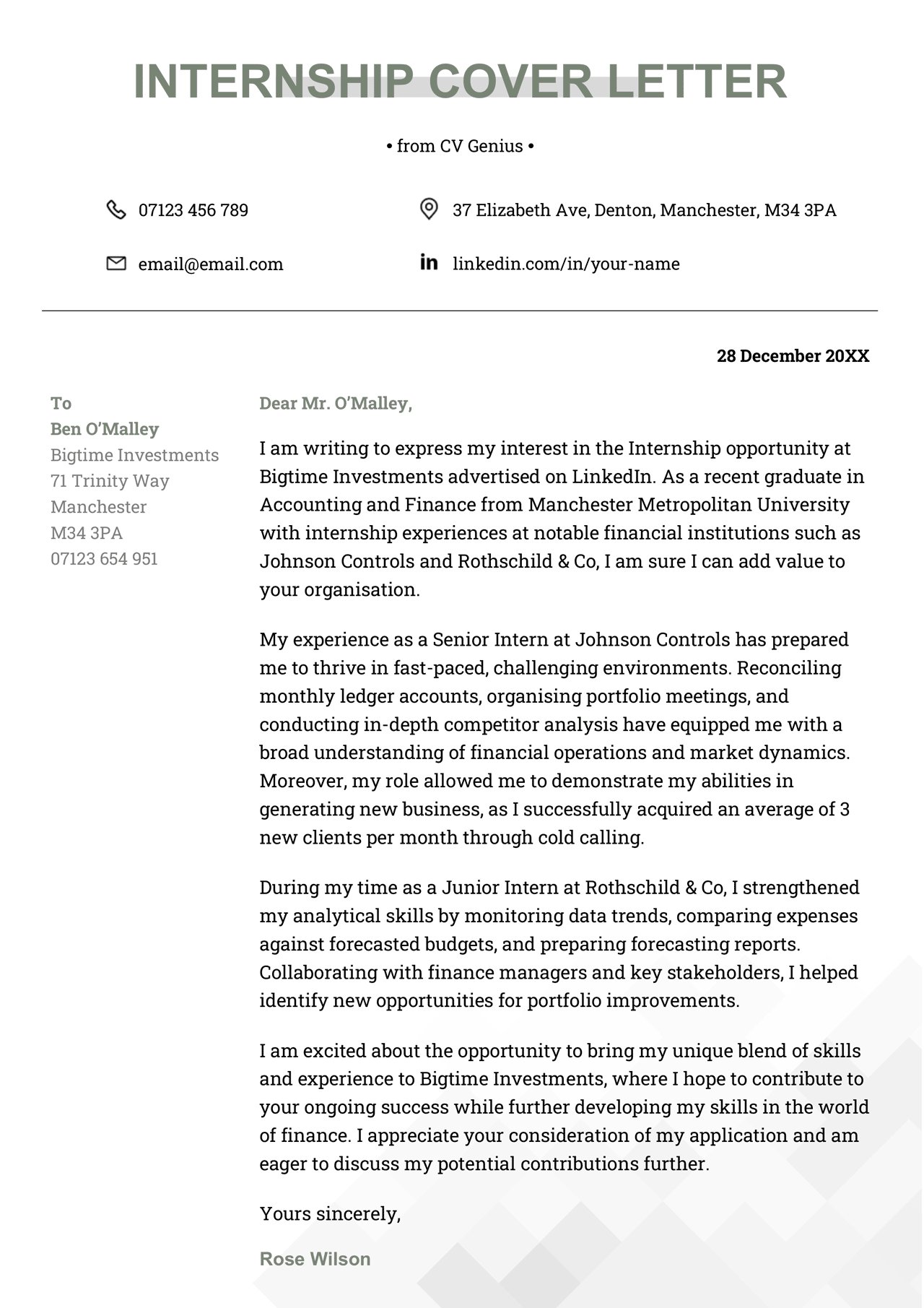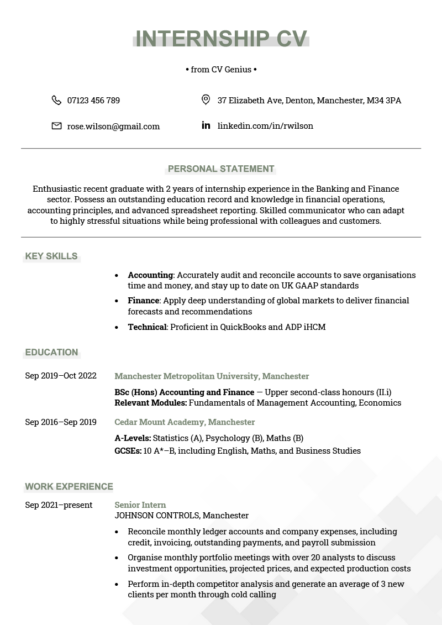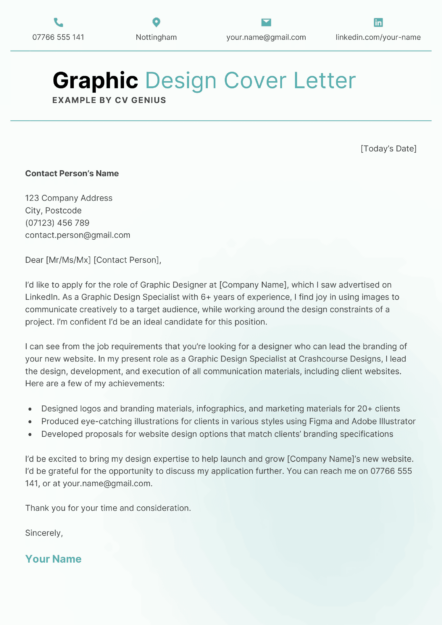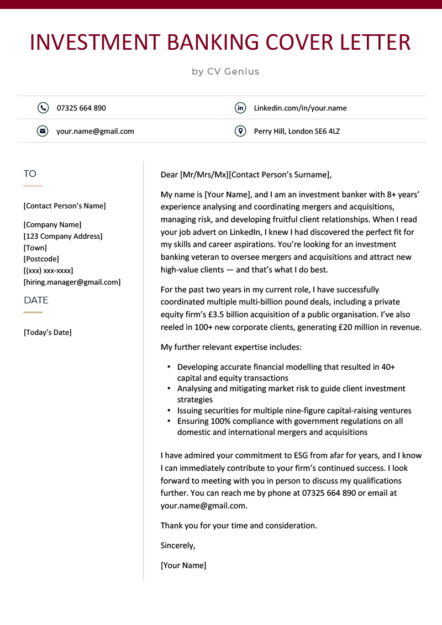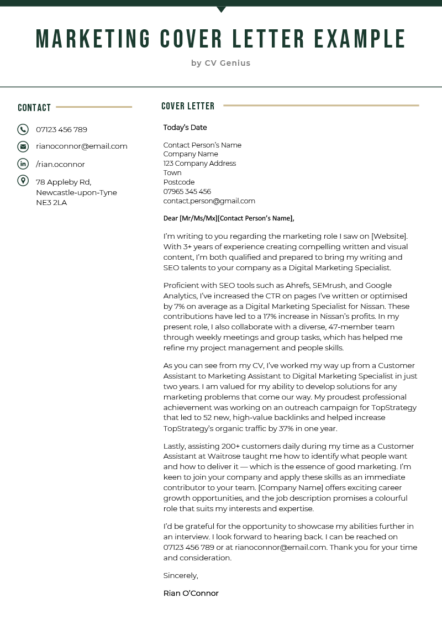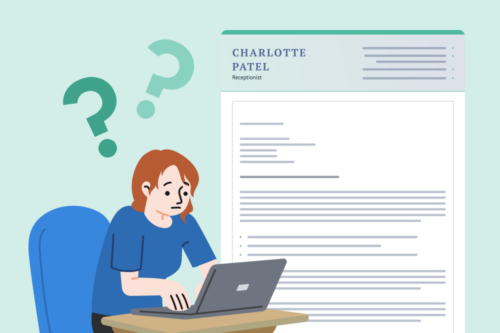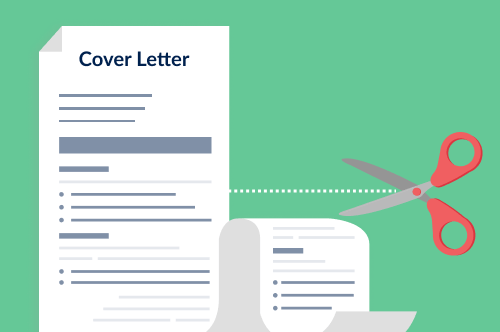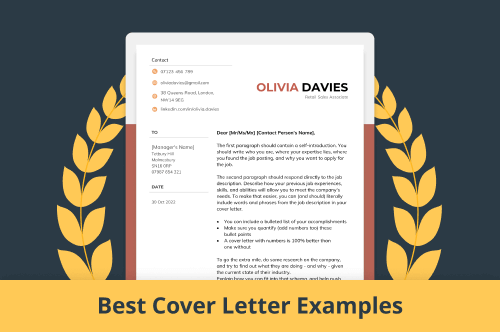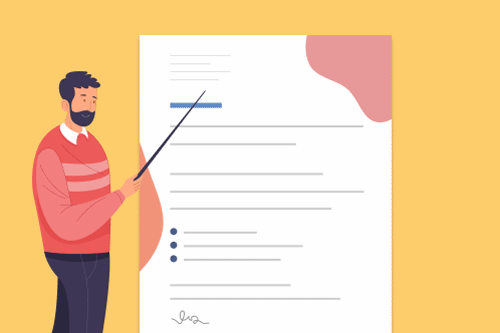Be sure you use the proper cover letter format to make your cover letter readable and professional.
Cover Letter for Internship Template (Text Format)
[Today’s Date]
Contact Person’s Name
Company Name
Number and Street Name
Town
Postcode
Contact Person’s Phone Number
Contact Person’s Email
Dear [Mr/Ms/Mx] [Contact Person’s Name],
I am writing to express my interest in the Internship opportunity at Bigtime Investments advertised on LinkedIn. As a recent graduate in Accounting and Finance from Manchester Metropolitan University with internship experiences at notable financial institutions such as Johnson Controls and Rothschild & Co, I am sure I can add value to your organisation.
My experience as a Senior Intern at Johnson Controls has prepared me to thrive in fast-paced, challenging environments. Reconciling monthly ledger accounts, organising portfolio meetings, and conducting in-depth competitor analysis have equipped me with a broad understanding of financial operations and market dynamics. Moreover, my role allowed me to demonstrate my abilities in generating new business, as I successfully acquired an average of 3 new clients per month through cold calling.
During my time as a Junior Intern at Rothschild & Co, I strengthened my analytical skills by monitoring data trends, comparing expenses against forecasted budgets, and preparing forecasting reports. Collaborating with finance managers and key stakeholders, I helped identify new opportunities for portfolio improvements.
I am excited about the opportunity to bring my unique blend of skills and experience to Bigtime Investments, where I hope to contribute to your ongoing success while further developing my skills in the world of finance. I appreciate your consideration of my application and am eager to discuss my potential contributions further.
Yours sincerely,
[Your Name]
How to write a cover letter for an internship
Before you begin writing, make sure you know how to write a cover letter in a way that makes you seem like the best candidate for the job.
Doing an internship is a good way to get experience that you can then use to apply for full-time roles in your field of interest. But to land the position you want, you first need to convince employers that you’re the candidate they’re looking for by writing an engaging internship cover letter.
Here’s how to make a cover letter for an internship in four steps:
1. Use proper formatting
Recruiters often perceive your letter as a reflection of your work ethic and attention to detail. When you follow proper formatting, you demonstrate your commitment to presenting your best work, which implies you’ll put the same effort into the internship.
A properly formatted cover letter for an internship includes the following:
Your internship cover letter should be single-spaced, with a space between each paragraph. Keep it succinct and to the point, fitting your most relevant education and experience onto one page so you don’t give busy employers too much to read — look at short cover letter samples to get a good idea of what works.
Use a good online CV maker to ensure your internship CV is also properly formatted.
2. Write an engaging opening statement
An engaging introduction to an internship cover letter grabs the reader’s attention by immediately explaining why you’re a strong candidate for their specific role. Here’s how to write an introduction that gets employers excited about reading the rest of your letter:
- State the internship you want. Large companies often have multiple internships open at the same time, so make it clear which one you want.
- Mention the company by name and express your interest or admiration for what they do. This shows that your application is not generic and that you have a genuine interest in working with them.
- Convey enthusiasm about the opportunity to apply for the role. Try to intrigue the reader by offering a brief insight into what makes you a unique candidate. This could be a quick highlight of your academic achievements, relevant skills, or past experiences related to the role.
Here’s an example of how these steps might come together:

Remember, your introduction should be concise, professional, and focused, setting a positive tone for the rest of the letter.
Look at cover letter examples from your field of work to get more ideas for writing an introduction that gets employers interested in hiring you.
3. Connect every detail to the role you’re targeting
Customising your internship cover letter to the target position is crucial to showing employers that you’ve thoroughly read the job description and understand what the role involves.
So read the job description carefully, looking for specific skills, experiences, or areas of knowledge the employer is seeking. Then, once you have a grasp of the job requirements, highlight your education, voluntary, and internship experiences that directly align with them.
But don’t just list your relevant details. Instead, provide specific examples that demonstrate these qualifications, using hard numbers where possible to show the impact you can make if hired.
Also, show that you’ve done your homework on the company. Mention what excites you about the company’s mission, product, or services, and how you could contribute to their work. This could be something you admire about their approach, a recent project they’ve undertaken, or their company culture.
Remember, customising your cover letter for each application takes more time, but it significantly improves your chances of getting noticed and landing an interview. Generic cover letters are often obvious and may give the impression that you’re not genuinely interested in the role.
4. Proofread your internship cover letter
Imagine this scenario: the recruiting manager has narrowed down a pool of internship applicants to you and a few other candidates. In a close competition like this, every detail matters, and a single typo in your cover letter could cost you a great role.
So don’t forget to check your cover letter for an internship for errors before you send it. Here are a couple of proofreading tips to ensure you submit the perfect internship cover letter:
- Ask a friend to edit for you — just remember to check any changes they make
- Plug it into an online editing program like Grammarly
